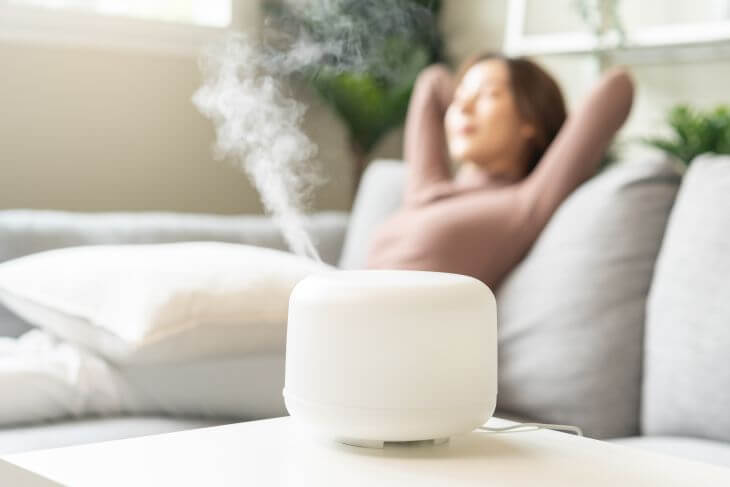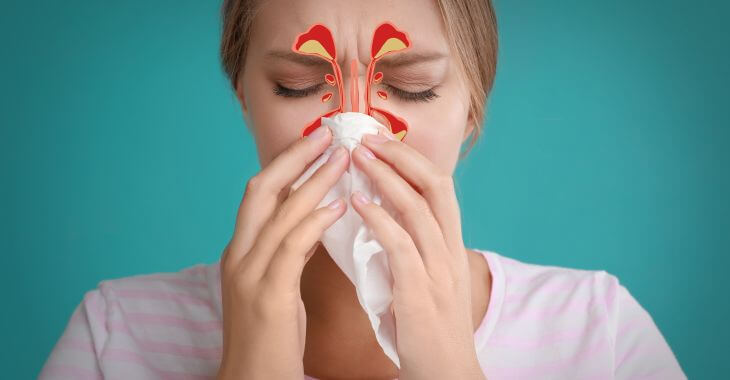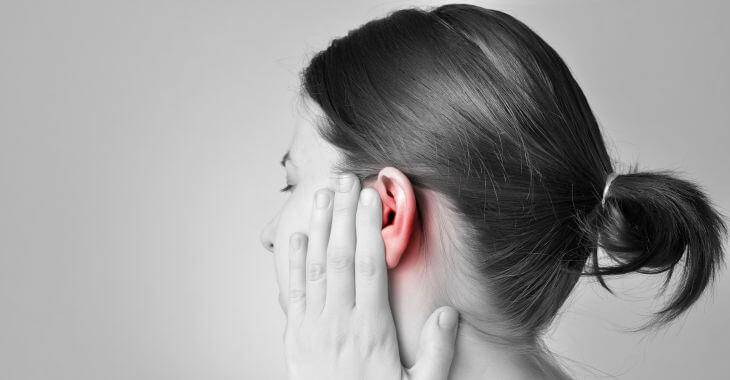Treatment, Causes, and Symptoms of Dry Sinuses

If you wake up with a dry nose and throat feeling, you may be experiencing dry sinuses. The sinuses are the cavities surrounding the nose and eyes that help warm and moisturize the air you breathe. Here is what you need to know about dry sinuses, including causes, symptoms, and treatment.
The sinus cavities are lined with mucus membranes which are meant to stay moist. However, there are conditions that can dry out the mucus in these membranes, which may be uncomfortable. Knowing the symptoms, causes, and how to treat dry sinuses can help prevent complications.
Symptoms of Dry Sinuses
When your sinus membranes lose moisture, it can be uncomfortable. Just like dry skin can be itchy and irritating, the same can occur inside your head. Since the nose, throat, mouth, and sinuses are all connected, you may experience symptoms in all these areas. Symptoms of dry sinuses include:
- Dry nose and throat
- Nosebleeds
- Sore throat
- Headaches
- Sinus pain or pressure
- Dry mouth
- Equilibrium issues
When you are not producing enough mucus to keep the sinuses moist, it can be uncomfortable. The air you breathe through your nose stays dry and dries out the airway passages through the back of the mouth into the throat and lungs. Over time, this can cause the previous symptoms and other issues.
Can Dry Sinuses Cause Dizziness?
One of the symptoms of dry sinuses that may be surprising is dizziness. The sinuses are connected to the ear canals which are vital for maintaining your equilibrium. Dry sinuses can be related to sinus infections, which can cause pressure that affects the ear canals, including the Eustachian tubes.
The Eustachian tubes control balance. If these tubes are blocked or irritated due to sinus problems that back up fluids into the ear canals, it can cause a feeling of dizziness and vertigo due to the impact on the Eustachian tubes. This most commonly occurs with sinus infections or sinusitis.
Causes of Dry Sinuses
There are several possible causes of dry sinuses. There are health conditions, environmental factors, and other possible irritants that can contribute to dry mucus membranes in the sinuses. Pinpointing the cause of your sinuses can determine the best options on how to treat dry sinuses.
- Seasonal Allergies
- One of the most common causes of inflamed sinuses is allergies, especially hay fever and other seasonal allergies. When you have seasonal allergies the sinus cavities can become inflamed and dry, resulting in thick or sticky mucus, a dry nose/throat, itchy nose/throat, and many other allergy symptoms.
- Indoor Allergies
- Beyond allergies to pollens and other outdoor allergens, indoor allergies can also cause dry sinuses. Pet dander, dust mites, molds, and other indoor allergens can cause similar symptoms to seasonal allergies, including dry sinuses.
- Dry Air
- During certain seasons and in some indoor environments, the air can be too dry. Some regions have cold, dry winters that can dry out the sinuses. Indoor climate control systems can also dry out the air, including central heat and air conditioning.
- Medications
- Unfortunately, many of the medications you may take to combat causes of dry sinuses can make the issue worse. Decongestants and antihistamines that are taken for allergies and colds are designed to reduce mucus and may overly dry out the nose and sinuses.
- Irritants in the Air
- Smoke, chemicals, fumes, and other irritants that float in the air can contribute to dry sinuses. These particles can irritate the sinuses and cause allergic reactions that can result in a dry nose and throat, as well as other symptoms. These air-borne irritants can be indoors or outdoors.
Treatment for Dry Sinuses
If your sinuses stay dry, they can cause complications such as chronic nosebleeds and sinus infections that require antibiotics and other treatments. Determining the cause of your dry sinuses can help you choose the best way to help relieve your symptoms. Some options include:
- Use a humidifier to add moisture to your indoor air
- Stay hydrated
- Reduce exposure to allergens if possible
- Irrigate your nasal and sinuses (a neti pot or similar device)
- Use nasal sprays to moisturize your mucus membranes
- Breathe in steam (hot shower or sauna)
- Change medications – ask your doctor for alternatives
- Use air filtration to remove irritants from the air
- Using a face mask to reduce exposure to air-borne irritants
If you have chronic dry sinuses, it may be due to a health condition. Visit your doctor if conservative treatments like those listed above are ineffective. There are autoimmune disorders such as Sjögren syndrome and certain infections that require medical treatment.

Dry sinuses are a common issue, but most people can get relief by addressing the cause such as using a humidifier or removing allergens. If you have chronic dry sinuses or severe symptoms, you should see your doctor to determine the cause and how to get relief.
The information provided on this website, including text, graphics, images, and other materials, is intended solely for informational purposes and should not be used as a substitute for professional medical advice, diagnosis, or treatment.




)